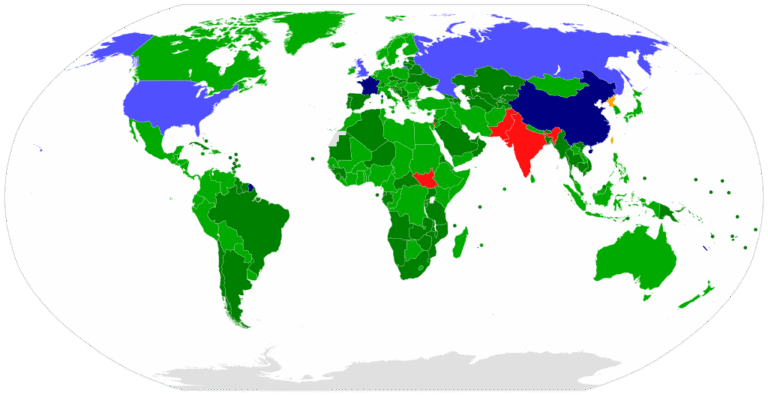The Nuclear Non-Proliferation Treaty (NPT) is a critical international agreement designed to prevent the spread of nuclear weapons and promote peaceful uses of nuclear energy. It also aims to encourage global nuclear disarmament. Since its creation during the Cold War, the treaty has become the foundation of worldwide efforts to control nuclear arms and maintain international security. Opened for signature in 1968 and coming into force in 1970, the NPT represents a global commitment to reduce the dangers posed by nuclear weapons while allowing responsible use of nuclear technology for non-military purposes.
The NPT rests on three important pillars: non-proliferation, peaceful use of nuclear energy, and disarmament. The non-proliferation pillar means that countries without nuclear weapons agree not to develop or acquire them. At the same time, countries that already possess nuclear weapons agree not to assist others in obtaining these weapons. This dual commitment aims to limit the number of countries that have nuclear weapons and reduce the risk of nuclear conflict. The peaceful use pillar recognizes the right of all countries to use nuclear energy for purposes such as electricity generation, medical treatments, and scientific research. However, this must be done under strict international safeguards to ensure that nuclear materials are not diverted for weapons development. The disarmament pillar commits nuclear-armed states to pursue negotiations in good faith to reduce their nuclear arsenals and move toward eventual elimination.
Almost every nation in the world is a party to the NPT. Currently, 191 countries have signed the treaty, making it one of the most widely supported arms control agreements. The treaty recognizes five countries as nuclear-weapon states: the United States, Russia, the United Kingdom, France, and China. These countries are the only ones legally allowed to possess nuclear weapons under the treaty. All other signatories agree not to develop or acquire nuclear weapons, creating a clear division between nuclear and non-nuclear states under international law.
To ensure that countries comply with their commitments, the International Atomic Energy Agency (IAEA) plays a key role in monitoring and verification. The IAEA conducts inspections and oversees safeguards agreements to confirm that nuclear materials are not diverted from peaceful uses to weapons programs. Countries that are parties to the treaty must allow these inspections and provide detailed reports on their nuclear activities. This system of verification helps build trust and transparency among nations and strengthens the global non-proliferation regime.
Despite its widespread acceptance, the NPT faces challenges and criticisms. Some countries have refused to join the treaty or have withdrawn from it. For example, North Korea withdrew in 2003 and has since developed nuclear weapons, raising concerns about the treaty’s effectiveness in preventing proliferation. Other countries, such as India, Pakistan, and Israel, have never signed the NPT but possess nuclear weapons, complicating efforts to maintain a universal non-proliferation regime. Critics argue that the treaty creates a double standard by allowing certain countries to keep nuclear weapons while denying others the same capability. There is also ongoing debate over whether nuclear-armed states are fulfilling their disarmament obligations quickly and sincerely enough.
The NPT remains a key element of international efforts to reduce the risks posed by nuclear weapons. It provides a legal framework for cooperation on nuclear security, the peaceful use of nuclear technology, and disarmament negotiations. The treaty is reviewed every five years at international conferences, where member states assess progress and discuss future steps. These review meetings are important opportunities for diplomatic engagement and reaffirmation of commitments to the treaty’s goals.
As tensions rise over nuclear programs in different parts of the world, the Nuclear Non-Proliferation Treaty continues to play a vital role in shaping global security. It seeks to balance the peaceful benefits of nuclear energy with the urgent need to prevent the spread of nuclear weapons and work toward a safer, more stable world.







